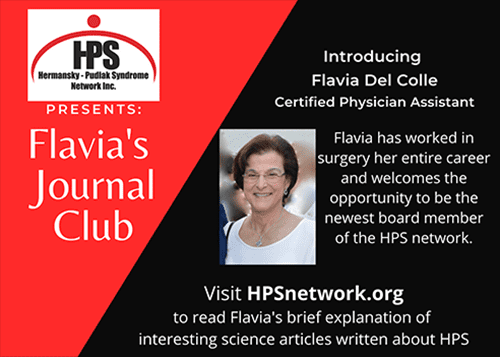Flavia’s Journal Club
“This European study shows how HPS research is far reaching. Not only are dense bodies being studied but also Weibel Palade bodies that form the lining of blood vessels and heart. They play a dual role in preventing bleeding and inflammation. You enable this kind of research by your blood samples.”
Defective AP-3-dependent VAMP8 trafficking impairs Weibel-Palade body exocytosis in Hermansky-Pudlak Syndrome type 2 blood outgrowth endothelial cells
Ellie Karampini,1,* Maaike Schillemans,1,* Menno Hofman,1 Floris van Alphen,2 Martin de Boer,3 Taco W. Kuijpers,3,4 Maartje van den Biggelaar,1 Jan Voorberg,1,5 and Ruben Bierings1,6
Author information, Article notes, Copyright and License information, Disclaimer
This article has been cited by other articles in PMC.

Abstract
Weibel-Palade bodies are endothelial secretory organelles that contain von Willebrand factor, P-selectin and CD63. Release of von Willebrand factor from Weibel-Palade bodies is crucial for platelet adhesion during primary hemostasis. Endosomal trafficking of proteins like CD63 to Weibel-Palade bodies during maturation is dependent on the adaptor protein complex 3 complex. Mutations in the AP3B1 gene, which encodes the adaptor protein complex 3 β1 subunit, result in Hermansky-Pudlak syndrome 2, a rare genetic disorder that leads to neutropenia and a mild bleeding diathesis. This is caused by abnormal granule formation in neutrophils and platelets due to defects in trafficking of cargo to secretory organelles. The impact of these defects on the secretory pathway of the endothelium is largely unknown. In this study, we investigated the role of adaptor protein complex 3-dependent mechanisms in trafficking of proteins during Weibel-Palade body maturation in endothelial cells. An ex vivo patient-derived endothelial model of Hermansky-Pudlak syndrome type 2 was established using blood outgrowth endothelial cells that were isolated from a patient with compound heterozygous mutations in AP3B1. Hermansky-Pudlak syndrome type 2 endothelial cells and CRISPR-Cas9-engineered AP3B1−/− endothelial cells contain Weibel-Palade bodies that are entirely devoid of CD63, indicative of disrupted endosomal trafficking. Hermansky-Pudlak syndrome type 2 endothelial cells have impaired Ca2+-mediated and cAMP-mediated exocytosis. Whole proteome analysis revealed that, apart from adaptor protein complex 3 β1, also the μ1 subunit and the v-SNARE VAMP8 were depleted. Stimulus-induced von Willebrand factor secretion was impaired in CRISPR-Cas9-engineered VAMP8−/−endothelial cells. Our data show that defects in adaptor protein complex 3-dependent maturation of Weibel-Palade bodies impairs exocytosis by affecting the recruitment of VAMP8.

